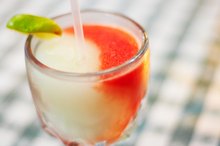What does fact checked mean?
At Healthfully, we strive to deliver objective content that is accurate and up-to-date. Our team periodically reviews articles in order to ensure content quality. The sources cited below consist of evidence from peer-reviewed journals, prominent medical organizations, academic associations, and government data.
The information contained on this site is for informational purposes only, and should not be used as a substitute for the advice of a professional health care provider. Please check with the appropriate physician regarding health questions and concerns. Although we strive to deliver accurate and up-to-date information, no guarantee to that effect is made.
Is Ginkgo Biloba Safe While Drinking Alcohol?
Ginkgo biloba is an herbal supplement used to improve brain function. Some herbal supplements interact with different medications as well as foods. Ginkgo biloba does not interact with alcohol, but both affect your blood flow and taken together may increase your risk of bleeding. Before adding any herbal supplements to your diet, you should first discuss its safety with your doctor.
If you are experiencing serious medical symptoms, seek emergency treatment immediately.
Gingko Biloba
The seeds and leaves of the ginkgo biloba tree, one of the oldest tree species, are used to treat a number of disorders, including respiratory and circulatory disorders, sexual dysfunction and hearing loss. The extract of ginkgo biloba has anti-infective and anticancer properties. Ginkgo biloba is also used as a supplement to help improve cognitive function and prevent dementia and Alzheimer's, although research regarding its effectiveness has been inconclusive, according to the Memorial Sloan-Kettering Cancer Center 1.
Alcohol and Blood
How Alcohol Affects Norvasc
Learn More
Drinking alcohol affects your blood cells and how they function, namely the ability of your blood to clot. Alcohol decreases platelet production and affects its function. Platelets are the cells in your blood needed for blood clots to form. Low blood platelet levels and dysfunction increases your risk of bleeding. If you take blood thinners, such as aspirin, and drink alcohol, your risk of gastrointestinal bleeding significantly increases.
- Drinking alcohol affects your blood cells and how they function, namely the ability of your blood to clot.
Ginkgo Biloba and Alcohol
You do not have to avoid alcohol when supplementing with ginkgo biloba, according to both the Memorial Sloan-Kettering Cancer Center and the American Academy of Family Physicians 1. However, ginkgo also affects blood clotting and may cause spontaneous bleeding, and it is recommended that you not take ginkgo biloba supplements with blood thinners. Combining alcohol with ginkgo biloba may further increase your risk of bleeding. If you take ginkgo biloba, talk to your doctor about alcohol and safe amounts to consume with the dietary supplement.
- You do not have to avoid alcohol when supplementing with ginkgo biloba, according to both the Memorial Sloan-Kettering Cancer Center and the American Academy of Family Physicians 1.
- However, ginkgo also affects blood clotting and may cause spontaneous bleeding, and it is recommended that you not take ginkgo biloba supplements with blood thinners.
Other Interactions with Ginkgo Biloba
The Effects of Alcohol on Oxygen Absorption
Learn More
Ginkgo biloba interacts with a number of different medications. It increases the effects of monoamine oxidase inhibitor and reduces the effectiveness of anti-seizure medications. In one case, ginkgo extract was associated with a coma in an Alzheimer's patient taking trazadone. It also alters insulin secretion and can affect blood glucose levels.
- Ginkgo biloba interacts with a number of different medications.
- It also alters insulin secretion and can affect blood glucose levels.
Related Articles
References
- Memorial Sloan-Kettering Cancer Center: Gingko Biloba
- American Family Physician: Herbal Remedies: Adverse Effects and Drug Interactions
- Alcohol Health & Research World: The Hematological Complications of Alcoholism
- Mei N, Guo X, Ren Z, Kobayashi D, Wada K, Guo L. Review of ginkgo biloba-induced toxicity, from experimental studies to human case reports. J Environ Sci Health C Environ Carcinog Ecotoxicol Rev. 2017;35(1):1-28. doi:10.1080/10590501.2016.1278298
- Xiong XJ, Liu W, Yang XC, et al. Ginkgo biloba extract for essential hypertension: a systemic review. Phytomedicine. 2014;21(10):1131-6. doi:10.1016/j.phymed.2014.04.024
- Weinmann S, Roll S, Schwarzbach C, Vauth C, Willich SN. Effects of ginkgo biloba in dementia: systematic review and meta-analysis. BMC Geriatr. 2010;10:14. doi:10.1186/1471-2318-10-14
- Saccà SC, Corazza P, Gandolfi S, et al. Substances of interest that support glaucoma therapy. Nutrients. 2019;11(2). doi:10.3390/nu11020239
Writer Bio
Jill Corleone is a registered dietitian and health coach who has been writing and lecturing on diet and health for more than 15 years. Her work has been featured on the Huffington Post, Diabetes Self-Management and in the book "Noninvasive Mechanical Ventilation," edited by John R. Bach, M.D. Corleone holds a Bachelor of Science in nutrition.








